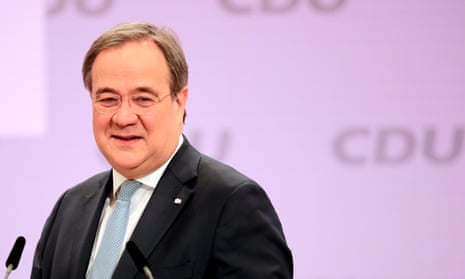Angela Merkel’s continuity candidate, the centrist conservative Armin Laschet, has beaten one of her longest-standing rivals in the contest to lead Germany’s Christian Democratic Union.
In a digitally-held party congress, Laschet beat the conservative hardliner Friedrich Merz by 521 to 466 votes in a run-off vote, following a strong speech that emphasised social cohesion and held up recent scenes from Washington DC as a warning example of divisive leadership.
The third candidate on the ballot, the foreign policy specialist Norbert Röttgen, was eliminated in the first round of voting.
Once the digital vote has been confirmed by a postal ballot, Laschet will formally replace Merkel’s previously designated successor, Annegret Kramp-Karrenbauer, who announced her resignation as CDU chair in February 2020 after an unsuccessful period in the spotlight. Merkel stepped down as party chair in December 2018.
In times of geopolitical unrest and pandemic uncertainty, Laschet’s promise to follow Merkel’s consensual course may also earn him the opportunity to lead the Christian Democrats into German elections on 26 September as his party’s official candidate for chancellor.
In theory, the party could nominate another politician to run for the chancellorship: potential candidates would be Markus Söder, the popular leader of CDU’s Bavarian sister party, the CSU, or the health minister, Jens Spahn, who ran as the number two in Laschet’s campaign.
If Laschet were to be anointed as the CDU’s chancellor candidate in the coming weeks, he would find himself up against campaigning against the colourless but competent Social Democrat Olaf Scholz, currently Germany’s finance minister, and either Annalena Baerbock or Robert Habeck representing the Greens, currently second in the polls.
As a former member of the “pizza connection” – a loose network of young conservative and Green delegates who scoped out political similarities over dinner in the mid-90s – Laschet would seem a natural fit to lead the CDU into its first ever coalition with the ecological party.
Under current projections, a CDU-Green coalition would be the only power-sharing deal to guarantee an absolute majority at federal elections. Laschet, and his two rival contenders, had already ruled out a coalition with the far-right Alternative für Deutschland, currently polling at around 8%.
The only one of the three candidates to currently hold a governing post, the Roman Catholic from Aachen has governed Germany’s most populous state, North-Rhine Westphalia since 2017 in a coalition with the pro-business Free Democrats. Previously an MEP and a minister for integration in his home state, he was a vocal ally of Merkel’s open-borders policy during the 2015 refugee crisis.
Laschet was initially seen as the clear favourite to win the race for the German centre-right’s leadership, but his nationwide approval ratings plummeted during the pandemic.
An early advocate of relaxing Germany’s first lockdown in the spring, he drew criticism over lackadaisical leadership. Most recently, there were charges of nepotism over PPE procured from a fashion company that also employs his son to model its clothes on his Instagram channel.
According to a recent poll by broadcaster ZDF, only 28% of Germans surveyed thought he had the calibre to become chancellor, compared with ratings of 54% for Söder and 45% for Scholz.
Questions remain over his foreign policy views, which have yet to be fully probed. “The Germany that I envision is a European Germany”, Laschet said in his speech on Saturday.
But his past complaints about “anti-Putin populism” and sympathetic comments about Syria’s president, Bashar al-Assad, have raised eyebrows among colleagues in the broadly trans-Atlanticist CDU.
At Saturday’s digital congress, the three candidates delivered short speeches in an empty congress hall, pitching their qualities to the 1,001 delegates watching on their home computers.
Laschet made the best of the unusual circumstances with a speech that would not have been out of place at the rival Social Democrats’ congress, woven around a personal story about his miner father’s solidarity with his fellow workers.
Pointing to the recent scenes of mob violence in Washington DC, Laschet cautioned against inviting similar levels of division in German political debate and came close to likening his rival Merz to the US president: “Some people say you have to polarise opinion. I say no, you don’t have to. Anyone can polarise opinion.”
Merz’s and Röttgen’s speeches, by contrast, were lighter on storytelling and heavier on buzzwords, with both candidates seemingly trying to brush off some of the views they have been typecast for.
An impressive orator in more confrontational settings, Merz’s speech in particular lacked focus. His boast that “my wife wouldn’t have married me” if his views on women were really as outdated as his critics had painted them is unlikely to have swayed any female delegates.
Laschet reminded delegates in his speech that over the last 15 years many people will have voted for the CDU because they were fans of Angela Merkel, not because they admired her party. State elections in Baden-Württemberg and Rhineland-Palatinate on 14 March will serve as a first indicator whether the Laschet-led CDU can replicate that success.
